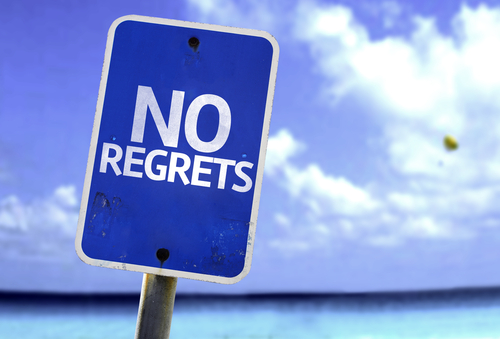Regret is a powerful emotion because it can be as deep and painful as other emotions, yet we bring it on ourselves. Some have called it a ‘useless’ emotion because it focuses on what we “should” have done differently in the past. But in the moment, how we acted or reacted, or the choices we made, seemed to be right at the time, or, at the very least, all we could have managed.
But ultimately, most human beings are doing the very best they can do, whether it always seems that way or not. To constantly focus on the past leaves very little time or energy to do better in the present and the future.
“Regret is useless in life. It’s in the past. All we have is now.”
― Marlon Brando
Common Regrets
Bronnie Ware is an Australian nurse who spent several years working in palliative care, caring for patients in the last 12 weeks of their lives. During this time, she repeatedly found that her patients gained phenomenal clarity and insight into their lives and the choices they made throughout. When asked about any regrets they had, Ware’s patients would often have the same, common answers:
Living Life on Others’ Terms
The most common regret Ware’s patients had was not having the courage to live life as they wanted, but to make choices based on what others’ thought they should and shouldn’t do. This left many of them with unrealized dreams.
Working Too Hard
How many of us have been told by friends and family that we shouldn’t work too hard, but should instead take time to stop and smell the roses? And how many of us ignore this advice because, after all, the roses’ scent isn’t going to pay off the mortgage and put money into our 401K plans?
Ware’s patients often said they regretted working too hard because it meant time spent away from children’s plays and birthday parties; time away from getting closer to their spouse and friends.
Feelings Left Unexpressed
Like Ware’s patients, many of us keep our feelings tucked away somewhere safe so as to never rock the boat or upset others with our truth. But this results in energy spent not being who we really are and ultimately illness caused by deep-seeded negatively and bitterness.
Falling Out of Touch with Friends
It’s so easy when we’re young to spend time with our friends. In fact, when we’re young, our friends ARE our family. But then we get older and we move away and get married and have children and responsibilities that make it incredibly hard to have the time to nurture these relationships any longer.
We know we should call or text or email so-and-so, but before we know it, something calls our attention away and one day we realize we have very few people we can truly call friends. We have acquaintances, we have neighbors and coworkers, but the friendships fade away and we find ourselves regretting it.
Fear of Change
Many of us share the same fear as Ware’s patients (and the rest of humanity) and that is fear of change. We get comfortable in our patterns, even when those patterns create less of a life than we had imagined or desired. Better to hate what we know than fear what we don’t know, right? Nope. And the older and more comfortable we get, the harder it is to pry ourselves out of our comfort zones until it is too late and we regret the risks and chances we didn’t take.
7 Reasons to STOP Regretting the Past
No matter what our regrets are, it is pointless spending time with this futile exercise. Best to stop regretting the past for the following reasons:
Life Often Calls for Quick Decision-Making
The truth is, we don’t always have the time to thoughtfully contemplate a decision in front of us, and so we do the best we can at a moment’s notice. If the decision turns out to be the “wrong” one (as in one that ultimately doesn’t support our values or goals), we chose as best we could. Better to learn from the situation and move on.
Also, research conducted by scientists at the Max-Planck Institute found that most decisions are truly made in our subconscious minds before we even become conscious of them, so ‘we’re’ often out of the decision-making picture anyway!
Emotional VS Analytical Decision-Making
We are often told it is far more pragmatic and effective to make decisions with our head and not our heart, but this is not necessarily true. In fact, studies have shown that our brains may start out analyzing options, but very soon our emotions step in to give their two cents. In other words, there is no sense beating yourself up for being too emotional in your decision-making as human emotions are involved in every facet of our lives.
Disappointment is Healthy
That’s right, you heard me. Disappointment is often a great thing because it propels us to try harder and be better versions of ourselves. Far too often we regret outcomes simply because we don’t like how they feel; we are disappointed at the result. But disappointments give us an opportunity to redefine our goals as well as our strengths and weaknesses.
Bad Choices Can Lead to Self-Compassion
If we let them.
Let’s face it, when we make “bad” choices, who is the person who is the hardest on us? We are. If we let ourselves do it, we can practice self-compassion every time we make a decision that doesn’t pan out. Not only is self-compassion good for our overall mental health, but eventually we’ll get so good at it that we can extend this compassion to others.
Without Darkness There is No Light
It sounds like a bunch of new age mumbo jumbo but it’s actually very true: if everything always went our way… if we never felt any kind of sadness or anger… then how could we possibly know how awesome joy and happiness is? We don’t really know light unless we can compare it to darkness. Without disappointments our lives would be pretty bland and one note.
Choices Mean Freedom
Instead of focusing on the fact you made a bad or unhealthy choice, focus on the fact you had the freedom to choose. Focusing on freedom automatically breeds a sense of strength and confidence.
Bad Choices Bring Clarity
I’ve often thought that life is more like carving a statue than painting a picture. When you paint, you look at the canvas and decide what shapes and colors you want to add to it. But when you carve, you decide what you DON’T want so you can chisel away from the giant hunk of marble in front of you.
Bad choices help us identify what we don’t like or want in our life anymore and carve that away. While it is sometimes painful and frustrating, it is a creative process none-the-less.
Regrets waste time and energy. In this new year, let’s all try and regret less and live more.
(Editor’s note: A lot of people live their lives with a great burden of regret, and it’s slowly killing them inside. So please do me a favor and share this article with anyone who could benefit from it. Thanks!)
 Validating...
Validating... 







10 Comments